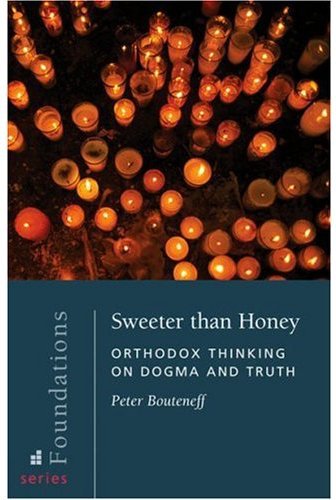
This book begins with a deeply thoughtful reflection on the nature of truth in the face of relativism, absolutism, and fanaticism showing Jesus Christ as the logic and love that undergirds and unites the universe. Part 2 is a journey through the landscape of Orthodox teaching, with a solid explanation of how it comes down to us today. Sweeter than Honey provides indispensable insight into Orthodox Christian thinking.
"It is a book that addresses important questions in a powerful way, with a courage to engage in the real world, rather than taking refuge in a twilight of the elves that often characterizes studies on Orthodox tradition.
I hope this will have a wide reception. Like most books that deal with the art of thinking – it might stretch people – and the author is a brave man to take on the task of making people think.
Congratulations on this work. It will be a significant book."
Rev. Dr. John A. McGuckin.
Professor of Church History - Union Theological Seminary
Professor of Byzantine Christianity - Columbia University
----------
As part of the SVS Foundations Series, Sweeter than Honey is meant to be a “popular” book, but this designation does not do justice to the difficult questions that Bouteneff tackles in an attractive and highly accessible way. …As we all know, it is much more difficult to put complex thought into simple language, but Bouteneff does a masterful job. …And while the book is addressed to an Orthodox audience, it could be profitable to any reader who values Christian tradition and its thoughtful defense.
Fr John A. Jillions
Sheptytsky Institute
Chancellor, Orthodox Church in America
----------
Calling a book “popular” can signal many things, some good and some not. What the label "popular" often means is that the book provides more answers than questions. To make a complicated subject accessible to lay people, the popular book often papers over the vexing questions that experts debate, and simply provides easily digestible answers to those complex questions.
Bouteneff's book is different. It is indeed popular in the sense that it is accessible to the non-specialist. Bouteneff avoids needless jargon, and explains well whatever technical terms he uses. Likewise, the book's warm, dialogical style is regularly punctuated by questions like "Now, what does this mean?" which create the sense of informal conversation. So, it is indeed accessible. But it is not popular in the sense described above. It is the antithesis of those popular books that provide easy answers and ignore difficult questions.
The central point of the book is, in fact, to confront precisely those difficult questions that accompany professing Orthodox faith in contemporary America. How can we assert that Jesus Christ is the only Truth, and the absolute Truth, in an environment that relativizes all truths to personal preferences, so that I have my truth and you have your truth, and we are both right?
In addressing these core questions, Bouteneff rejects both the knee-jerk relativism of contemporary culture, as well as the triumphalism of an unthinking absolutism. In the end, the reader is given an expression of traditional Orthodox teaching on how Jesus Christ is the Truth, and the only Truth, and how the Orthodox Church is the bearer of that Truth, but always with an eye to responding to the particular questions of the present age. There are discussions of creeds, of Scripture, of saints, of church hierarchs and of icons, but all of them geared toward the core question of how the Orthodox Church defends the Truth of the Gospel. And, because of Bouteneff's approach, the treatment of standard topics seems new, especially in the sections on Scripture and Church leadership. There is an urgent need for just such a book, especially one aimed at the non-professional. For these are not questions only asked by students and professors of theology. These are questions that confront people each time they walk out their front doors or, more and more, pass through the virtual front doors of their computers. This is an excellent introduction to the Orthodox faith, written in a unique fashion, and with a view toward contemporary debates. It can be read with profit by beginners and more advanced readers alike.
Dr. George L. Parsenios,
Associate Professor of New Testament
Princeton Theological Seminary
